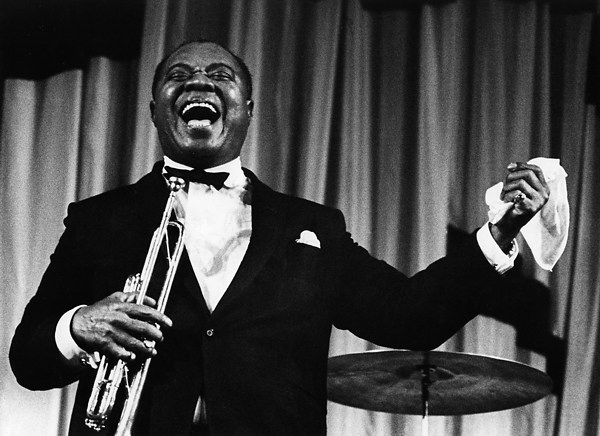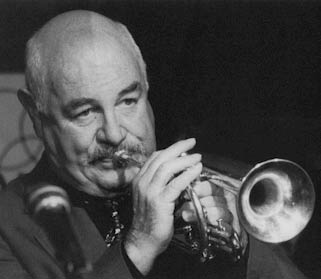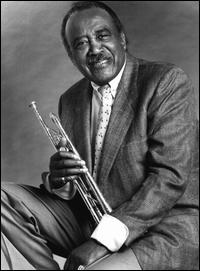
Louis Armstrong. Photo courtesy mp3lyrics.org.
Born into a crime and poverty-stricken neighborhood of New Orleans known as ‘the Battlefield’ on August 4, 1901, Armstrong would sometimes adjust his birthdate and proclaim the 4th of July of the year 1900 his perfectly-timed, patriotic entry into the world. To acknowledge Armstrong’s historical birthday, we celebrate August 4th and to honor the birthday of his dreams, we bring out the cake and light the candles on the 4th of July offering back-to-back, double birthday greetings to Louis Armstrong, a man who lived up to his legend.
Our Louis Armstrong birthday concert includes repertoire Armstrong made famous during his long career with performances by The Jim Cullum Jazz Band and their friends recorded live at The Landing in San Antonio and other venues. We dip into the Riverwalk archive for favorite recordings by special guests piano legend Dick Hyman, trumpet giants Harry “Sweets” Edison and Nicholas Payton, Australia’s Bob Barnard on cornet and the zany vocals of guitarist Marty Grosz. It’s our way a saying “Happy Birthday, Louis at 100!”
.jpg)
Trumpeter Nicholas Payton. Photo courtesy of the artist.
New Orleans native Nicholas Payton gets the show under way, sitting in with The Jim Cullum Jazz Band on two numbers recorded by Armstrong in 1929 and 1930 for the Okeh label’s “race” division: “Mahogany Hall Stomp” and “Tiger Rag.“ The first makes reference to Lulu White’s sumptuous, 4-story brothel in New Orleans vice district Storyville of the early 1900s. Ms. White’s adopted son Spencer Williams composed “Mahogany Hall Stomp,” in remembrance of the place he called home. The latter is a well-worn standard of New Orleans jazz, first recorded by the Original Dixieland Jazz Band in 1917.
Louis Armstrong collaborated with Jelly Roll Morton, the self-proclaimed inventor of jazz, on composing “Wild Man Blues.“ Armstrong recorded the tune as part of his groundbreaking series with his Hot Seven in 1927. Our version is a duet with Jim Cullum on cornet and John Sheridan on piano. Australian cornet master Bob Barnard joins Jim and the band for a driving rendition of “Willie the Weeper,“ another title from the same 1927 session.

Cornetist Bob Barnard. Photo courtesy of the artist.
Pop singers Frank Sinatra and Bing Crosby and jazz singers Billie Holiday and Ella Fitzgerald are among many star performers to acknowledge Armstrong’s gravelly voice as a major inspiration for their personal vocal styles. Guitarist Marty Grosz joins The Jim Cullum Jazz Band on an Armstrong original, spotlighting the great New York cornetist Warren Vaché, Jr. in a performance at The Landing. Armstrong’s 1936 recording for Decca in New York showcases an affecting vocal by Louis on the gorgeous, “If We Never Meet Again.”
“It's Wonderful” was composed in 1938 by Swing Era violinist Stuff Smith and recorded that same year by Louis Armstrong and His Orchestra, a big band conducted by Luis Russell. The interpretation here is a vocal rendition by Broadway’s Vernel Bagneris with The Jim Cullum Jazz Band, captured live at The Crest Theatre.
Canadian saxophonist Jim Galloway dropped by to offer birthday wishes to Louis Armstrong with his instrumental rendition of an Armstrong hit from 1933, “There’s a Cabin in the Pines.”
.jpg)
Rebecca Kilgore. Photo courtesy of the artist.
Jazz singer Rebecca Kilgore teams up with trumpeter Jon-Erik Kellso for a swinging salute to Louis Armstrong on a classic tune composed by Harry Warren with lyrics by Johnny Mercer, “Jeepers Creepers.” Introduced by Armstrong in the 1938 motion picture Going Places, the song was nominated for an Oscar for Best Song. In the movie, Armstrong played a racehorse trainer in charge of a horse who would run only in the presence of his personal trainer.
For more than forty years Jim Cullum has dedicated much of his life in music to studying and performing the music of Louis Armstrong. “Weatherbird Rag“ is a masterpiece Louis Armstrong composed in 1923 and recorded as a duet with Chicago pianist Earl Hines. The rendition heard here spotlights Dick Hyman on piano with Jim Cullum on cornet.

Trumpeter Harry "Sweets" Edison. Photo courtesy of Riverwalk Jazz.
In 1930, Louis Armstrong and Bing Crosby were both in Los Angeles and quickly became friends and musical colleagues. “I Surrender Dear” was one of many ballads first recorded by Bing and subsequently covered by Louis.
“Fireworks,“ penned by Spencer Williams, was recorded as an Armstrong Hot 5 in 1928. Jim Cullum and his Band live up to the title with their explosive signature version.
Trumpeter Harry “Sweets” Edison was a key member of the Count Basie Orchestra. During his visit to the Landing in San Antonio, Sweets left us with a memorable and heartfelt tribute to Armstrong on “When It's Sleepy Time Down South,“ the theme song of Louis Armstrong and His Orchestra.
Photo credit for Home Page: Louis Armstrong. Photo courtesy tarleton.edu.
Text based on Riverwalk Jazz script by Margaret Moos Pick ©2001

